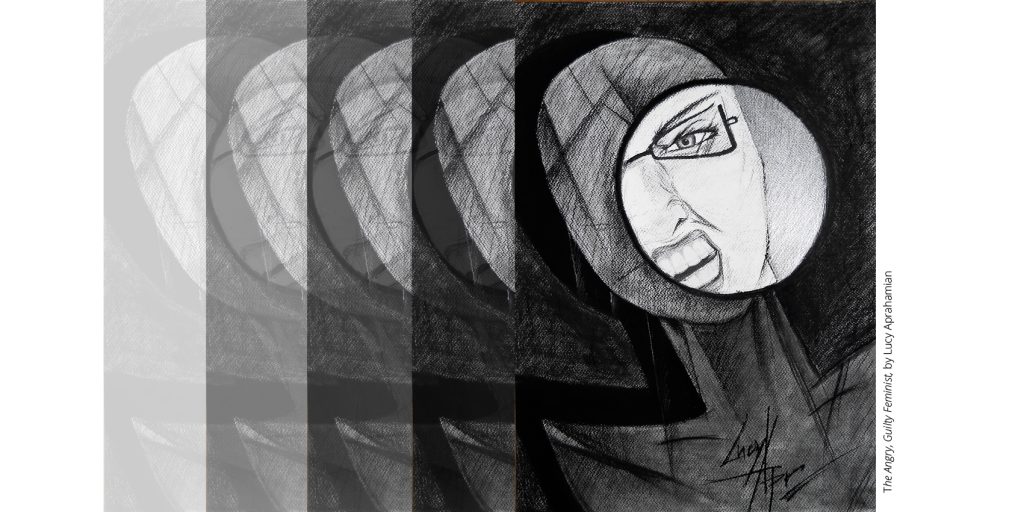by Lucy Aprahamian
![]() am a proud feminist. However, as I write this, the lady sat at the nearest table in my favourite caf├® pulls a pocket mirror out of her handbag and for a second I think that there is no way the same handbag also contains a book. I often put effort into appearing as if I never worry about my looks, therefore ending up ÔÇô you guessed it ÔÇô worrying about my looks. In addition to judging strangersÔÇÖ handbag contents, I also tend to judge women who use the hashtag #girlboss (because a man would never call himself a #boyboss). On a daily basis, I struggle to find the balance between being a firm and outspoken, but not aggressive feminist ÔÇô I shouldnÔÇÖt contribute to the stereotype, even though anything misogynistic, patriarchal or sexist enrages me, including my own long list of faults. I spend numerous hours criticising myself in inner debates on whether I am too much of a white feminist or abled, or young, or privileged feminist. Worst of all, when another woman states she doesnÔÇÖt consider herself a feminist, I am more likely to think of her as a traitor and ÔÇ£the enemyÔÇØ than a victim of patriarchy. I certainly am a bad feminist. And yetÔǪ arenÔÇÖt we all?
am a proud feminist. However, as I write this, the lady sat at the nearest table in my favourite caf├® pulls a pocket mirror out of her handbag and for a second I think that there is no way the same handbag also contains a book. I often put effort into appearing as if I never worry about my looks, therefore ending up ÔÇô you guessed it ÔÇô worrying about my looks. In addition to judging strangersÔÇÖ handbag contents, I also tend to judge women who use the hashtag #girlboss (because a man would never call himself a #boyboss). On a daily basis, I struggle to find the balance between being a firm and outspoken, but not aggressive feminist ÔÇô I shouldnÔÇÖt contribute to the stereotype, even though anything misogynistic, patriarchal or sexist enrages me, including my own long list of faults. I spend numerous hours criticising myself in inner debates on whether I am too much of a white feminist or abled, or young, or privileged feminist. Worst of all, when another woman states she doesnÔÇÖt consider herself a feminist, I am more likely to think of her as a traitor and ÔÇ£the enemyÔÇØ than a victim of patriarchy. I certainly am a bad feminist. And yetÔǪ arenÔÇÖt we all?
The fact is, we all grew up in an imperfect society which far too often told us women must be perfect or at least settle for an endless strive for perfection. Some of these ideas have naturally left residual marks, regardless of the amount of effort to erase them. So many people strive not only to be feminists but be perfect feminists ÔÇô special (almost mythical) creatures who never fail to challenge misogyny regardless of the context and circumstances, who donÔÇÖt know the lyrics to a single sexist song, no matter how big a hit it may be, who couldnÔÇÖt care less about stereotypical notions of beauty, keep a picture of Judith Butler on their wall and certainly never for a second tire of heated debates on moral values and equality. The perfect feminists never slip up, never have an off day and, shock and horror, do not exist. What does exist, however, is a shocking number of feminist women who live in fear they might accidentally say something unsupportive of another woman, or might wake up one morning and not feel body positive; feminist men who fear they might accidentally interrupt a woman when she speaks, or unintentionally mansplain their views.
Unfortunately, no person can consistently be the absolute embodiment of a movement; we all have bad feminist moments, or get judged for not conforming to a certain accepted image of ÔÇ£the feministÔÇØ. The importance should be placed not on hiding perceived fallbacks but on listening to other points of view, asking the right questions and accepting imperfections. After all, ÔÇ£no one can make you feel inferior without your consentÔÇØ, not even the judgmental voice in your own head.
* * *
In the next two months, Q3 will explore the faults, guilt and insecurities that come with being a modern-day feminist. Stay tuned for our confessions, criticisms and attempts towards a more realistic and diverse view of the movement.










